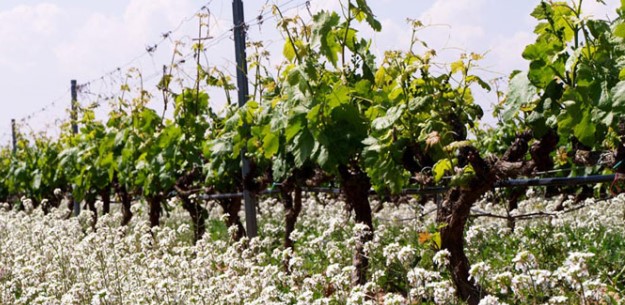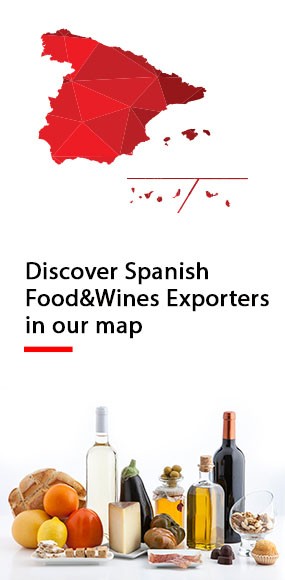.png.transform/rendition-xs/image_image%20(1).png)
Spanish Organic Wines
Founded in 2014, Spanish Organic Wines is comprised of small and medium-sized organic wineries that believe that the best way to bring their quality products to international palates is by joining forces.

There's been a lot of talk lately about Spain's dominance of the organic wine industry. This should come as no surprise to those who have followed the meteoric expansion of this industry over the past few years, watching the surface area dedicated to organic vines in Spain increase by 172% in only five years (from 2008 to 2013). But for those who haven't heard the news, Spain's significant role in this growing market, bears repeating. With approximately 84,000 hectares dedicated to organic vines in 2013 -last official data available,-, according to the Spanish Ministry of Agriculture, Food and the Environment (MAGRAMA), Spain enjoys a more-than comfortable lead over second and third-place growers Italy and France (with approximately 68,000 and 64,000, respectively). What's more, Spain also leads in terms of organic wine production, accounting for 27% of the world's organic wines.
At the same time, the demand for organic wines in Spain has a long way to go to catch up with these production levels. In fact, various sources put consumption of organic wine anywhere from 1 to 4% of this country's total. Fortunately, this is not true for key export markets like the rest of Europe and the United States, where Spanish organic wine sales are thriving. Therefore, organic wine producers in Spain have unsurprisingly set their sights on the export market, while creating new and innovative ways to do just that.
Enter Spanish Organic Wines
Founded in September of 2014, Spanish Organic Wines is comprised of thirty-five Spanish wineries scattered throughout ten of this country's seventeen Autonomous Communities. The majority of the member-wineries are small and medium-sized operations, many of which are family owned and operated. Even so, nineteen of the wineries already export more than 50% of their production, and the hope is that, by pooling their resources, they and the other members will continue to increase their reach and export potential.
In order to learn a little more about Spanish Organic Wines (hereafter S.O.W.), Foods and Wines from Spain spoke with the association’s Manager Ignacio Bidegain. Here's what he had to say:
How did S.O.W. come about?
The idea for the association started with the Asociación de Empresas de Agricultura Ecológica de Navarra (Organic Agriculture Association of Navarre - AEN), an organization made up of a dozen organic wineries from Navarre. After organizing four editions of FIVE, the Feria Internacional del Vino Ecológico (International Organic Wine Fair) in Pamplona from 2010-2014, the AEN brought participating wineries from the last edition together to discuss setting up a national association dedicated to promoting organic wine on an international level. The result came to life in September of 2014 in the form of Spanish Organic Wines, which began formally with three wineries from Navarre.
How many regions and quality guarantees are represented by S.O.W.?
The 35 members include wineries in ten Autonomous Communities belonging to eighteen Denominations of Origin (Getariako Txakolina, Navarra, Rioja, Rías Baixas, Sierra de Salamanca, Ribera de Duero, Rueda, Manchuela, Jumilla, Montilla-Moriles, Valencia, Conca de Barberà, Penedès, Empordà, Alella, Valdepeñas, Costers de Segre and Cava), and three "Vinos de la Tierra" designations (Castilla, Mallorca and Villaviciosa de Córdoba). We also have a member-winery in Cádiz without any designations.
And how many brands and types of wines do you represent?
I'm not sure about the exact number of brands, but it might be around 150. As far as types of wines, we have Cavas, fortified wines, reds, whites and rosados, as well all different levels of aging, and categories of wine that include sulfate-free wines, blends, single-variety wines, etc. It's important to point out that the associated wineries use a total of around fifty different types of grapes, a fact that makes our wines extremely diverse.
Is the organization growing?
We had 29 wineries before the last edition of PROWEIN (March 2016), and there are currently 35. In any case, we aren't trying to grow for the sake of growing. We want to add wineries that have a similar, family-artisanal profile, are committed to organic production and interested in promoting international trade.
What is the goal of the association and what services does it provide for members?
Our objective is to promote export and make it easier for members to collectively attend fairs and similar events that might be of interest to them. The total cost of every initiative is divided proportionally between the participating wineries.
Do the association's wines bear any type of seal or specific marking?
No. The only thing our wines must have is the organic certification mark granted by the officially recognized European Union certifying body.
What are the most important markets for S.O.W.'s wines?
Germany, the United Kingdom, Scandinavia, the Netherlands, Switzerland, the United States and Japan.
Which fairs do you attend?
So far we've attended PROWEIN and FENAVIN as an association.
How are Spanish organic wines viewed overseas?
They are very successful. The reception in international markets has been very positive, thanks to the fact that we are exporting bottled wines (not bulk) that are more "artisanally-made" than conventional wines.
How do you see the future of this market?
The following statistics provide an indirect indication (of how things are going):
There were 195 (Spanish) wineries making organic wine in 2003, and 669 in 2013.
There were 16,500 hectares of organic vineyards in Spain in 2003, and 84,000 in 2013.
Organic vines represented 2.27% of all Spanish vineyards in 2003, and 5.47% in 2013.
The future of the wine world (in good measure) is organic production.
There's been a lot of talk lately about Spain's dominance of the organic wine industry. This should come as no surprise to those who have followed the meteoric expansion of this industry over the past few years, watching the surface area dedicated to organic vines in Spain increase by 172% in only five years (from 2008 to 2013)
Adrienne Smith/©ICEX


